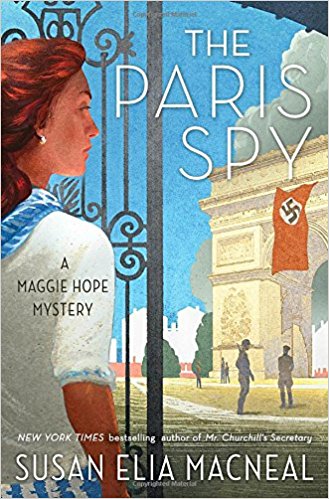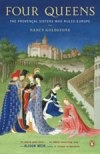 A few roses are starting to come in a month early this year. Though they are pink, not white, I cannot but think of that wonderful quote by Elizabeth Barrett Browning. “For if I wait … ‘till time for roses be, what glory then for me?” Here it is in the full context of the poem she wrote in honor of the early rose.
A few roses are starting to come in a month early this year. Though they are pink, not white, I cannot but think of that wonderful quote by Elizabeth Barrett Browning. “For if I wait … ‘till time for roses be, what glory then for me?” Here it is in the full context of the poem she wrote in honor of the early rose.
A Lay of the Early Rose
‘ . . . discordance that can accord.’
— Romaunt of the Rose.
A ROSE once grew within
A garden April-green,
In her loneness, in her loneness,
And the fairer for that oneness.
A white rose delicate
On a tall bough and straight:
Early comer, early comer,
Never waiting for the summer.
Her pretty gestes did win
South winds to let her in,
In her loneness, in her loneness,
All the fairer for that oneness.
‘For if I wait,’ said she,
‘Till time for roses be,
For the moss-rose and the musk-rose,
Maiden-blush and royal-dusk rose,
‘What glory then for me
In such a company? —
Roses plenty, roses plenty
And one nightingale for twenty!
‘Nay, let me in,’ said she,
‘Before the rest are free,
In my loneness, in my loneness,
All the fairer for that oneness.
‘For I would lonely stand
Uplifting my white hand,
On a mission, on a mission,
To declare the coming vision.
‘Upon which lifted sign,
What worship will be mine?
What addressing, what caressing,
And what thanks and praise and blessing!
‘A windlike joy will rush
Through every tree and bush,
Bending softly in affection
And spontaneous benediction.
‘Insects, that only may
Live in a sunbright ray,
To my whiteness, to my whiteness,
Shall be drawn as to a brightness, —
‘And every moth and bee
Approach me reverently,
Wheeling o’er me, wheeling o’er me,
Coronals of motioned glory.
‘Three larks shall leave a cloud,
To my whiter beauty vowed,
Singing gladly all the moontide,
Never waiting for the suntide.
‘Ten nightingales shall flee
Their woods for love of me,
Singing sadly all the suntide,
Never waiting for the moontide.
‘I ween the very skies
Will look down with surprise,
When below on earth they see me
With my starry aspect dreamy.
‘And earth will call her flowers
To hasten out of doors,
By their curtsies and sweet-smelling
To give grace to my foretelling.’
So praying, did she win
South winds to let her in,
In her loneness, in her loneness,
And the fairer for that oneness.
But ah, — alas for her!
No thing did minister
To her praises, to her praises,
More than might unto a daisy’s.
No tree nor bush was seen
To boast a perfect green,
Scarcely having, scarcely having
One leaf broad enough for waving.
The little flies did crawl
Along the southern wall,
Faintly shifting, faintly shifting
Wings scarce long enough for lifting.
The lark, too high or low,
I ween, did miss her so,
With his nest down in the gorses,
And his song in the star-courses.
The nightingale did please
To loiter beyond seas:
Guess him in the Happy Islands,
Learning music from the silence!
Only the bee, forsooth,
Came in the place of both,
Doing honor, doing honor
To the honey-dews upon her.
The skies looked coldly down
As on a royal crown;
Then with drop for drop, at leisure,
They began to rain for pleasure.
Whereat the earth did seem
To waken from a dream,
Winter-frozen, winter-frozen,
Her unquiet eyes unclosing —
Said to the Rose, ‘Ha, snow!
And art thou fallen so?
Thou, who wast enthroned stately
All along my mountains lately?
‘Holla, thou world-wide snow!
And art thou wasted so,
With a little bough to catch thee,
And a little bee to watch thee?’
— Poor Rose, to be misknown!
Would she had ne’er been blown,
In her loneness, in her loneness,
All the sadder for that oneness!
 Some word she tried to say,
Some word she tried to say,
Some no . . . ah, wellaway!
But the passion did o’ercome her,
And the fair frail leaves dropped from her.
— Dropped from her fair and mute,
Close to a poet’s foot,
Who beheld them, smiling slowly,
As at something sad yet holy, —
Said, ‘Verily and thus
It chances too with us
Poets, singing sweetest snatches
While that deaf men keep the watches:
‘Vaunting to come before
Our own age evermore,
In a loneness, in a loneness,
And the nobler for that oneness.
‘Holy in voice and heart,
To high ends, set apart:
All unmated, all unmated,
Just because so consecrated.
‘But if alone we be,
Where is our empery?
And if none can reach our stature,
Who can mete our lofty nature?
‘What bell will yield a tone,
Swung in the air alone?
If no brazen clapper bringing,
Who can hear the chimed ringing?
‘What angel but would seem
To sensual eyes, ghost-dim?
And without assimilation
Vain is interpenetration.
‘And thus, what can we do,
Poor rose and poet too,
Who both antedate our mission
In an unprepared season?
‘Drop, leaf! be silent, song!
Cold things we come among:
We must warm them, we must warm them,
Ere we ever hope to charm them.
‘Howbeit’ (here his face
Lightened around the place,
So to mark the outward turning
Of its spirit’s inward burning.)
‘Something it is, to hold
In God’s worlds manifold,
First revealed to creature-duty,
Some new form of his mild Beauty.
‘Whether that form respect
The sense or intellect,
Holy be, in mood or meadow,
The Chief Beauty’s sign and shadow!
‘Holy, in me and thee,
Rose fallen from the tree, —
Though the world stand dumb around us,
All unable to expound us.
‘Though none us deign to bless,
Blessed are we, natheless;
Blessed still and consecrated
In that, rose, we were created.
‘Oh, shame to poet’s lays
Sung for the dole of praise, —
Hoarsely sung upon the highway
With that obolum da mihi!
‘Shame, shame to poet’s soul
Pining for such a dole,
When Heaven-chosen to inherit
The high throne of a chief spirit!
Sit still upon your thrones,
O ye poetic ones!
And if, sooth, the world decry you,
Let it pass unchallenged by you.
‘Ye to yourselves suffice,
Without its flatteries.
Self-contentedly approve you
Unto HIM who sits above you, —
‘In prayers, that upward mount
Like to a fair-sunned fount
Which, in gushing back upon you,
Hath an upper music won you, —
‘In faith — that still perceives
No rose can shed her leaves,
Far less, poet fall from mission,
With an unfulfilled fruition, —
‘In hope, that apprehends
An end beyond these ends,
And great uses rendered duly
By the meanest song sung truly, —
‘In thanks, for all the good
By poets understood,
For the sound of seraphs moving
Down the hidden depths of loving, —
‘For sights of things away
Through fissures of the clay,
Promised things which shall be given
And sung over, up in Heaven, —
‘For life, so lovely-vain,
For death, which breaks the chain,
For this sense of present sweetness,
And this yearning to completeness!’
More on Elizabeth Barrett Browning at Poetry Foundation
More on Elizabeth Barrett Browning at Poets. Org
The Browning Society–promotes appreciation and awareness of the two poets
Casa Guidi–the Brownings house in Rome
The Armstrong Browning Library–for the research and study of the Brownings and Victorian poets
Post-Poetry Month Withdrawal
Like WordHits on Facebook
Follow @WordHits on Twitter
Read Full Post »
 April is National Poetry Month, founded in 1996 by the American Academy of Poets. And, I have been loving it! Poetry is therapeutic, especially in this, “the cruelest month” when we have days that feel like we just haven’t shaken winter.
April is National Poetry Month, founded in 1996 by the American Academy of Poets. And, I have been loving it! Poetry is therapeutic, especially in this, “the cruelest month” when we have days that feel like we just haven’t shaken winter.






 A few roses are starting to come in a month early this year. Though they are pink, not white, I cannot but think of that wonderful quote by Elizabeth Barrett Browning. “For if I wait … ‘till time for roses be, what glory then for me?” Here it is in the full context of the poem she wrote in honor of the early rose.
A few roses are starting to come in a month early this year. Though they are pink, not white, I cannot but think of that wonderful quote by Elizabeth Barrett Browning. “For if I wait … ‘till time for roses be, what glory then for me?” Here it is in the full context of the poem she wrote in honor of the early rose. Some word she tried to say,
Some word she tried to say,
 Has anyone else been dragging a bit this week? Perhaps it’s the five straight days of grey Dickensian mizzle, but also, I am missing the fanfare of
Has anyone else been dragging a bit this week? Perhaps it’s the five straight days of grey Dickensian mizzle, but also, I am missing the fanfare of 







